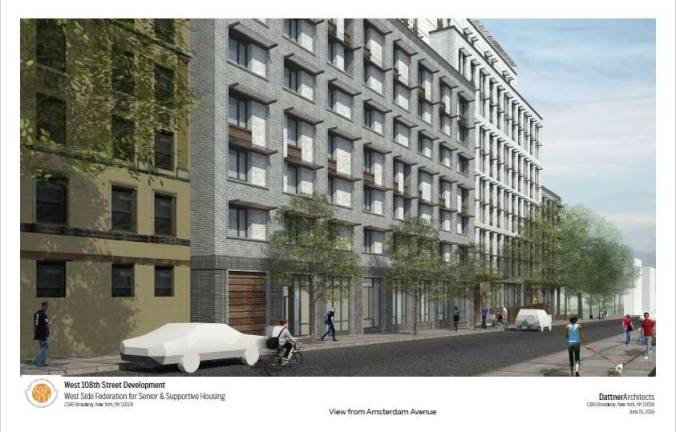Supporting housing — and diversity

Op-Ed
BY JULIE HERTZOG
It is up to all of us, as empathetic community members who value cultural diversity, to support affordable housing development in Manhattan Valley and across New York. I enthusiastically support West Side Federation for Senior and Supportive Housing's proposed development at West 108th Street, and the positive impact it will have on our neighborhood — and call on all Manhattan residents to stand with me in support.
First: For 25 years I have lived at the corner of Amsterdam and West 108th, in a 17-story building diagonally across from Valley Lodge, one of the parcels for the proposed development.
When we first moved here 25 years ago it was reluctantly: surely it wasn't as hip and exciting as the East Village, and we only planned to stay for two years — but we fell in love with the community's diversity. Young families lived next to senior citizens; people of every race, ethnicity, sexual orientation and economic background lived on every block.
Today, New York City is experiencing a severe housing affordability crisis — a one-bedroom apartment in my building rents for over $3,000 and can cost $800,000 to purchase. (I couldn't afford to buy my apartment today.) The result is that our neighborhood is losing the diversity that we so value. As the community continues to get safer and cleaner, with better schools and amenities, it has also become unaffordable to many people who could benefit from living here. Many are being priced out — the area is no longer what folks used to call “the poverty pocket of the Upper West Side” — and others of modest means will never have the chance to move in. WSFSSH's new development on 108th street will provide desperately-needed affordable housing to hundreds of seniors and families, who can use it as a platform to lead stable lives and improve job and educational prospects. Residents will no longer have to worry about whether they have enough money to pay the rent and buy food and necessities. For some, it will mean they no longer have to sleep in terrible conditions or on the streets. It will help us hold on to some of the diversity that reflects our values as a community.
Second: I own a car, which I park on the street. It's possible that it will be harder for me to do that after these garages on the planned project's footprint are gone, but I believe that the lives of those who will live and flourish in this building over the coming decades are more important than the parking luxury I enjoy, especially in a city with excellent public transportation. A new garage just opened at the building at the Cathedral, just four blocks away. Public Advocate Scott Stringer's office recently released a report that found a nearly 250 percent increase in the number of homeless children under 3 years old living in hotels; surely the best use of this site is for affordable housing.
Third: I've calculated that I've walked by Valley Lodge, the supportive housing unit nearby, more than 6,000 times on my way to and from Central Park with my dog, so I know that WSFSSH is a wonderful property manager that maintains its buildings well and that its residents make good neighbors. We've had nothing but positive interactions with everyone who lives at Valley Lodge.
Finally, spending all the time I do walking around the area, I also know that there are other buildings of similar size and height peppered throughout our neighborhood. Any arguments about the scale of the development do not fully acknowledge the context of the area and other existing nearby high-rise buildings. The garages are an eyesore, and a new well-designed and maintained building will benefit the area.
If this development is thwarted, it would be a missed opportunity of heartbreaking proportions. Manhattan boasts few developable sites of this size for affordable housing. As our neighborhood thrives and our property values increase, this is our last hope to ensure that working class families, seniors and veterans can continue to live here with us, enriching our lives and the life of our community.
Julie Hertzog consults with a national affordable housing advocacy organization that is not involved in this project.